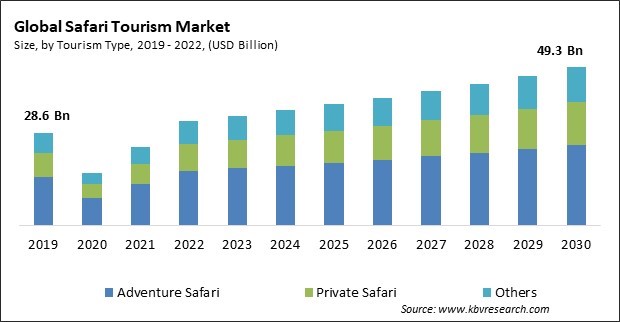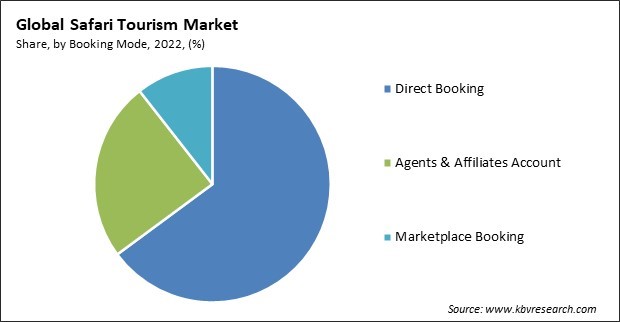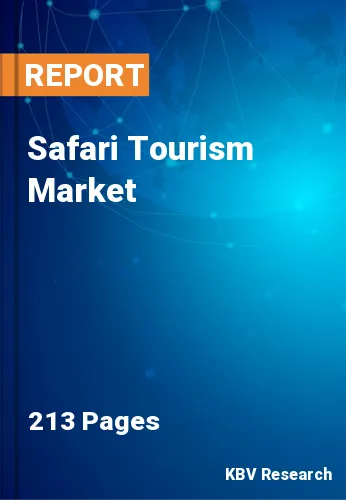The Global Safari Tourism Market size is expected to reach $49.3 billion by 2030, rising at a market growth of 5.4% CAGR during the forecast period.
The growing middle-class population in nations such as China and India, with increasing disposable incomes, is leading to a rise in outbound tourism. As such, the Asia Pacific market is expected to account nearly 22% of the total market share by 2030. Asia Pacific is home to several countries with diverse wildlife and natural landscapes, such as India, Sri Lanka, Nepal, and Indonesia. These destinations offer the potential for this tourism to thrive, attracting domestic and international visitors. Lastly, increased connectivity, improved infrastructure, and targeted marketing efforts propel regional market growth. Some of the factors impacting the market are environmental and wildlife conservation awareness, advancements in tourism technology and wildlife experiences disturbance from tourism activities.

There is a growing global consciousness about tourism on the environment and wildlife. Driven by a sense of responsibility, travelers seek safari experiences prioritizing conservation practices, sustainable tourism, and ethical wildlife encounters. Tourism allows travelers to engage in educational experiences about local ecosystems, wildlife behavior, and conservation challenges. Guided by knowledgeable naturalists and conservationists, tourists understand the importance of preserving natural habitats. The above factors will boost market growth in the coming years. Additionally, the availability of online booking platforms and reservation systems has simplified the process of planning and booking safari trips. Travelers can explore various safari options, compare prices, and make reservations conveniently from their computers or mobile devices. High-quality digital cameras, drones, and other photography equipment have empowered safari tourists to capture stunning images and videos of wildlife and landscapes. The ease of sharing these visuals on social media platforms contributes to promoting safari destinations. Therefore, Advancements in technology have opened new frontiers and expanded the market.
However, Continuous exposure to disturbances, such as noise from vehicles, crowds, or inappropriate behavior by tourists, can lead to behavioral changes in wildlife. Animals may alter their natural activities, feeding patterns, or migration routes, affecting the authenticity of the safari experience. Constant disturbances can disrupt the mating and reproductive behaviors of wildlife. This interference may result in reduced reproductive success, affecting certain species' population dynamics and long-term sustainability within a safari destination. Persistent disturbances may cause certain wildlife species to shift their distribution away from areas with high tourist activity. Thus, these aspects will decline market growth.
By booking mode, the market is classified into direct booking, agents & affiliates account, and marketplace booking. The marketplace booking segment recorded a remarkable revenue share in the market in 2022. This mode offers a user-friendly and conveniently situated platform for individuals to explore, contrast, and reserve safari experiences. Generally, marketplace booking platforms provide customer support services encompassing assistance with safari reservations, itinerary modifications, and resolving any concerns or issues that may arise before, during, or after the expedition. The platform enables the comparison of safari options offered by esteemed travel operators while ensuring dependable support throughout the procedure.

On the basis of tourism type, the market is segmented into adventure safari, private safari, and others. The private safari segment acquired a substantial revenue share in the market in 2022. Private safaris often provide a more intimate wildlife viewing experience. With a dedicated guide and vehicle, there is greater flexibility in choosing when and where to go, increasing the chances of encountering, and observing wildlife without the constraints of a larger group. The expansion of this market segment is propelled by the demand from travelers for unique and customized experiences.
Based on group, the market is fragmented into friends, families, couples, and solos. The friends segment garnered a significant revenue share in the market in 2022. Traveling with friends allows the group dynamics to enhance the overall experience. Shared laughter, conversations, and inside jokes create camaraderie, making the safari more enjoyable and memorable. Group travel often comes with the benefit of cost-sharing. Accommodations, transportation, and guided activities can be more economical when split among friends, making the safari experience more affordable. This trend is expected to boost the segment's growth over the forecast period.
| Report Attribute | Details |
|---|---|
| Market size value in 2022 | USD 32.5 Billion |
| Market size forecast in 2030 | USD 49.3 Billion |
| Base Year | 2022 |
| Historical Period | 2019 to 2021 |
| Forecast Period | 2023 to 2030 |
| Revenue Growth Rate | CAGR of 5.4% from 2023 to 2030 |
| Number of Pages | 213 |
| Number of Table | 360 |
| Report coverage | Market Trends, Revenue Estimation and Forecast, Segmentation Analysis, Regional and Country Breakdown, Porter’s 5 Forces Analysis, Company Profiling, Companies Strategic Developments, SWOT Analysis, Winning Imperatives |
| Segments covered | Group, Tourism Type, Booking Mode, Region |
| Country scope |
|
| Companies Included | Wilderness Holdings Limited (African Wildlife Holdings Partnership), Thomas Cook (India) Limited (Fairfax Financial Holdings Limited), Singita Group, Scott Dunn, Rothschild Safaris, Micato Safaris, TUI AG, Abercrombie & Kent USA, LLC, Butterfield & Robinson, Inc. and Backroads |
| Growth Drivers |
|
| Restraints |
|
Region-wise, the market is analysed across North America, Europe, Asia Pacific, and LAMEA. In 2022, the LAMEA region witnessed the largest revenue share in the market. The tourism in the region has been propelled by rising family vacation preferences and robust purchasing power. Furthermore, Africa is experiencing a surge in appeal as a preferred travel destination among global tourists, enticed by its distinctive cuisine, tranquil coastlines, ecotourism opportunities, and national parks. It is anticipated that the variety of tourism activities introduced will augment the influx of visitors to the area. Sharjah Emirate, for instance, inaugurated Sharjah Safari, the most expansive safari park outside of Africa, in March 2022.
Free Valuable Insights: Global Safari Tourism Market size to reach USD 49.3 Billion by 2030
The market research report covers the analysis of key stake holders of the market. Key companies profiled in the report include Wilderness Holdings Limited (African Wildlife Holdings Partnership), Thomas Cook (India) Limited (Fairfax Financial Holdings Limited), Singita Group, Scott Dunn, Rothschild Safaris, Micato Safaris, TUI AG, Abercrombie & Kent USA, LLC, Butterfield & Robinson, Inc. and Backroads
By Tourism Type
By Group
By Booking Mode
By Geography
This Market size is expected to reach $49.3 billion by 2030.
Environmental and wildlife conservation awareness are driving the Market in coming years, however, Wildlife experiences disturbance from tourism activities restraints the growth of the Market.
Wilderness Holdings Limited (African Wildlife Holdings Partnership), Thomas Cook (India) Limited (Fairfax Financial Holdings Limited), Singita Group, Scott Dunn, Rothschild Safaris, Micato Safaris, TUI AG, Abercrombie & Kent USA, LLC, Butterfield & Robinson, Inc. and Backroads
The expected CAGR of this Market is 5.4% from 2023 to 2030.
The Couples segment is generating the highest revenue in the Market by Group in 2022;there by, achieving a market value of $21.5 billion by 2030.
The LAMEA region dominated the Market by Region in 2022, and would continue to be a dominant market till 2030;there by, achieving a market value of $23.7 billion by 2030.
Our team of dedicated experts can provide you with attractive expansion opportunities for your business.

